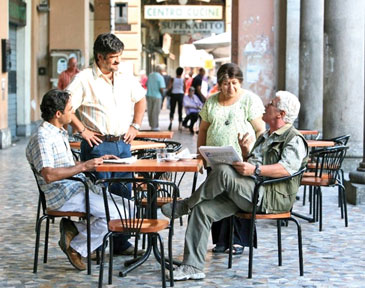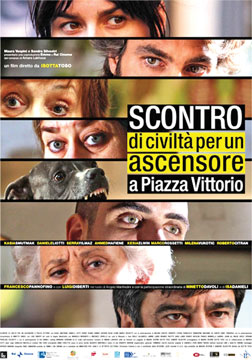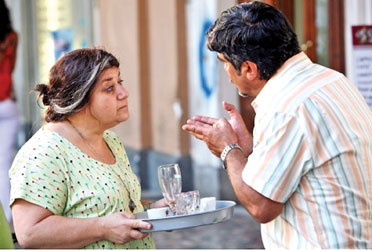‘Scontro di Civiltà per un Ascensore a Piazza Vittorio’
By Madeleine Wightman
 This
is a 2010 film release by Isotta Toso, originally based on a novel.
Algerian author Amara Lakhous (now an Italian resident) is the author of
this satire of an immigrant's life in Italy. This
is a 2010 film release by Isotta Toso, originally based on a novel.
Algerian author Amara Lakhous (now an Italian resident) is the author of
this satire of an immigrant's life in Italy.
The story explores the murder of a young man in the elevator of an
apartment building adjacent to Piazza Vittorio to show the hidden (and
not-so-hidden) prejudices of Roman residents toward "outsiders." The
victim, Lorenzo Manfredini, a young hood also known as the Gladiator,
had repeatedly defaced and urinated in the building's elevator, earning
the enmity of every resident. As residents and local merchants tell
their stories to a police inspector, their hidden agendas and casual
resentments against immigrants surface.
Amedeo, a resident uniformly admired by everyone, thought to be an
Italian volunteer who helps immigrants deal with Roman bureaucracy, is
sought for the crime. No one has seen him since the murder.
Lakhous shapes his story around this single apartment building on
Piazza Vittorio in Rome, an immigrant area. His building residents,
whose stories crisscross, offer a microcosm of modern Rome as they
battle over the deteriorating condition of their elevator.
He cleverly creates twelve unique voices as each person tells "the
truth according to...", alternating these separate voices with "wails"
from Amadeo as he comments on what the residents say.
Amedeo, who speaks Italian like a native, provides a running
commentary on Roman life, pointing up the contrasts between what people
say to other Italians and what they say and do about their immigrant
neighbours behind their backs.
As each person provides additional information about Amedeo and the
victim, the reader comes to know characters like Parviz Mansoor Samadi,
who has barely escaped from Iran, leaving his wife and four children;
Benedetta Esposito, "the oldest concierge in Rome," a Neapolitan whose
suspicions of all immigrants is determined by their behaviour with
regard to the temperamental elevator; and Iqbal Amir Allah, from
Bangladesh, whose observations about Amedeo's understanding of Muslim
customs lead him to say that "Signor Amedeo is as good as mango juice."
 The
owner of a local bar, a neighbourhood fish seller, and the police
inspector also give their impressions of Amedeo, the building residents,
and immigrants in general. The
owner of a local bar, a neighbourhood fish seller, and the police
inspector also give their impressions of Amedeo, the building residents,
and immigrants in general.
The characters' gradual revelations and Amedeo's commentary change
the reader's perceptions, and as the plot becomes more complex, the
story matches the sympathies one develops for the immigrants with the
understanding one evolves for those who resent the immigrants' perceived
privileges.
Often hilarious, the story carries an edge and though the author is
not heavy-handed with his satire, his points are obvious (and repeated)
as each character reveals prejudices and reactions to prejudice.
The conclusion takes on a somewhat different tone and style as police
inspector Mauro Bettarini, believing that "truth is like a coin: it has
two faces," gives two different possibilities to explain the murder.
Rounding out Lakhous’ neighbourhood—all these characters get to
narrate in separate chapters——are such finely drawn figures as Iqbal
Amir Allah, a grocer from Bangladesh whom Benedetta insists is Pakistani
(we like him despite his remark that in Italy “Massimo, Giulio and
Romano are all first names”); Sandro Dandini, owner of the piazza’s main
bar; Inspector Bettarini; and Maria Cristina Gonzalez, an overweight
Peruvian maid abused by Lorenzo.
One resident of the building links all these characters: Signor
Amedeo, Lakhous’ most appealing character, a translator and intellectual
who reads abstruse authors such as the Romanian aphorist E.M. Cioran.
The others, who largely disdain one another, like Amedeo.
Most assume he’s Italian because of his fluency, fine manners,
Italian wife, and aristocratic gait. But when police find “The
Gladiator” murdered in the building’s elevator, then name Amedeo as the
chief suspect, his own immigrant identity comes to the fore.
Elisabetta Fabiani, addicted to thrillers, also frets that her dog,
Valentino, has disappeared into dishes served by Chinese restaurants
popping up everywhere in the neighbourhood. Parviz Mansoor Samadi, an
Iranian cook forced to flee Shiraz by the Revolutionary Guards, refuses
to learn Italian cooking (he hates pizza and pasta) and so finds himself
bounced into dishwashing jobs and further indignities.
 Benedetta
Esposito, the building’s concierge from Naples, hates immigrants and
constantly calls Parviz “the Albanian”—and much worse. Antonio Marini, a
Milanese professor who moved to Rome to take a professorship at La
Sapienza, feels he has survived a Third World country and believes the
unification of Italy was an “irreparable historical mistake”—one
perspective the Milanese sometimes bring to Rome. Benedetta
Esposito, the building’s concierge from Naples, hates immigrants and
constantly calls Parviz “the Albanian”—and much worse. Antonio Marini, a
Milanese professor who moved to Rome to take a professorship at La
Sapienza, feels he has survived a Third World country and believes the
unification of Italy was an “irreparable historical mistake”—one
perspective the Milanese sometimes bring to Rome.
Lakhous orchestrates ’Scontro di Civiltà’ as a small symphony of
telling voices, with the winds predictably winning pride of place.
We hear voices of racism (Lorenzo’s “Italy for Italians! Italy for
Italians!”), exasperation (Benedetta’s “Living with them is
impossible!”), and even outrage from the new immigrants themselves (Iqbal
laments, “Why can’t the police be strict with immigrants who are
criminals? Why should the honest ones who sweat for a piece of bread
suffer?”).
Since Lakhous favours a lively, reportorial style, it would be easy
to let the slapstick moments of ’Scontro di Civiltà’ obscure its
fundamental seriousness as a photo of a society in transition.
To his credit, the author understands “reflex racism”—the shabby
thoughts of non-evil people who mouth observations their wiser selves
might reject.
So Elisabetta, arguing that dogs should be protected before
immigrants, asks, “Have you ever heard of a dog who raped its owner?”
By doing so, Lakhous maintains an even-handed angle on his characters
that helps them rise lifelike from the page.
Iqbal, one example of that, recalls that Amedeo once shared with him
the Prophet Muhammad’s thought that “to smile at someone is like giving
alms.” Lakhous’ kindly gaze at his cast in ’Scontro di Civiltà’ perhaps
is his way of noting that battling outsiders have defined Italy since
the beginning of time, and those clashes made Italy Italian. |

